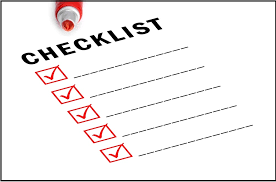Introduction: The Importance of Daily Checklists for Seniors and Individuals with Special Needs
For seniors and individuals with special needs, having a daily routine and checklist can make a world of difference in maintaining independence and ensuring essential tasks are completed. By establishing a structured daily checklist, individuals can stay organized, on track, and maintain a sense of accomplishment. This blog will provide a detailed daily checklist tailored specifically for seniors and individuals with special needs, covering a range of essential tasks and activities to promote well-being and independence.

Understanding the Unique Needs of Seniors
and Individuals with Special Needs
Understanding the unique needs of seniors and individuals with special needs is crucial in developing an effective daily checklist. Factors such as mobility limitations, medical conditions, and cognitive challenges require special consideration when creating a personalized checklist. By recognizing these specific needs, caregivers and individuals themselves can tailor the checklist to address areas like medication management, physical therapy exercises, social interactions, and dietary requirements. Ensuring that the checklist is not only comprehensive but also sensitive to individual limitations can significantly enhance daily living and overall well-being. Stay tuned for practical tips on customizing a daily checklist to meet these specialized needs.
Benefits of Utilizing a Daily Checklist in Care Plans
Daily checklists play a crucial role in enhancing the quality of care for seniors and individuals with special needs. By systematically organizing tasks and activities, caregivers can ensure that essential elements like medication
adherence, exercise routines, and social engagements are consistently addressed. Moreover, the use of a checklist promotes routine and structure, fostering a sense of stability and predictability for individuals with unique requirements. Tracking daily progress also allows for timely adjustments and effective communication among caregivers, healthcare providers, and the individuals themselves. In the next section, we will delve deeper into the practical ways daily checklists can streamline care plans and promote well- being. Stay tuned for valuable insights and tips on optimizing daily routines.
Essential Components of an Effective Daily Checklist
When creating a daily checklist for seniors and individuals with special needs, it is essential to include specific components to ensure comprehensive care. Key elements to consider are medication schedules, meal planning, hygiene routines, physical activities, and cognitive exercises. Incorporating reminders for important appointments, hydration goals, and social interactions can further enhance the checklist’s effectiveness. Additionally, personalized tasks based on the individual’s preferences and health requirements should be tailored for a holistic approach. Stay tuned for practical strategies on customizing daily checklists to optimize care plans and promote overall well-being.
Implementing the Daily Checklist: Tips for Caregivers and Family Members
Once you have crafted a detailed daily checklist for seniors and individuals with special needs, it is crucial to effectively implement it into their daily routine. Caregivers and family members play a vital role in ensuring the checklist is followed diligently. Consider discussing the checklist with the individual to make them feel involved and motivated. Setting realistic expectations and providing encouragement are essential in helping them stick to the routine. Regularly reviewing and adjusting the checklist as needed can also contribute to its success. Stay tuned for expert tips on how caregivers and family members can support and empower their loved ones through the daily checklist.
Addressing Common Challenges in Checklist Adherence
Adhering to a daily checklist can present challenges for seniors and individuals with special needs. In the next section, we will delve into common obstacles caregivers may encounter and provide practical solutions to overcome them. From managing resistance to change to addressing forgetfulness and adapting the checklist to evolving needs, we will explore strategies to facilitate successful adherence. Stay informed on how to navigate these challenges effectively to ensure the daily checklist remains a valuable tool in promoting independence and well-being. Stay tuned for valuable insights and guidance on overcoming obstacles in checklist adherence.
Conclusion: Enhancing Daily Living through
Structured Support
In conclusion, implementing a daily checklist can significantly enhance the daily living experiences of seniors and individuals with special needs. By acknowledging and actively overcoming challenges in checklist adherence, caregivers can create a structured support system that promotes independence and well-being. By incorporating practical solutions for managing resistance, forgetfulness, and evolving needs, caregivers can ensure that the checklist remains an effective tool for daily tasks. Stay committed to providing consistent support and guidance to individuals utilizing the checklist, to help them navigate daily routines with confidence and ease. By fostering a supportive environment, we can empower seniors and those with special needs to thrive and lead fulfilling lives.
